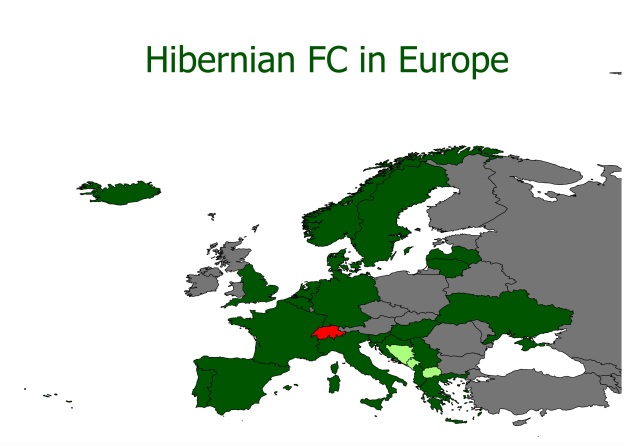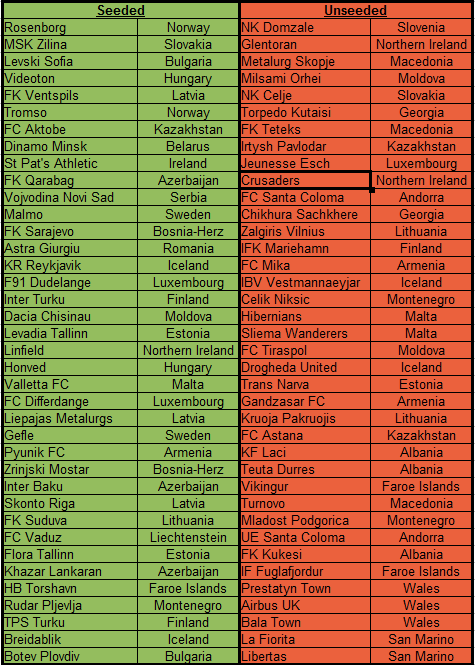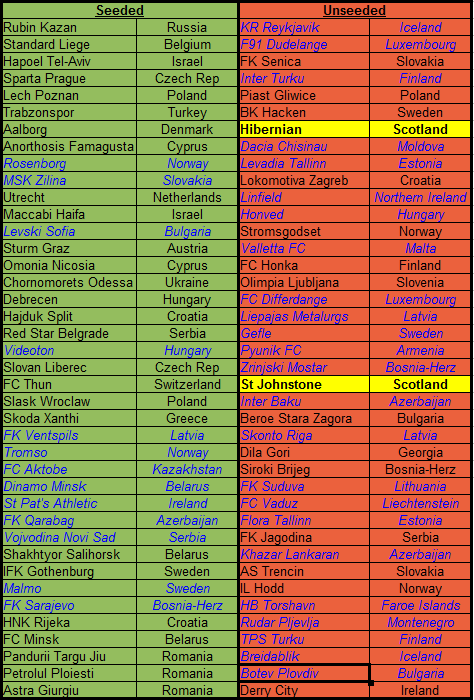Hibernian FC in Europe 2013/14
June 20, 2013 Leave a comment
Hibernian will enter the 2nd Qualifying Round of this season’s Europa League after finishing as runners up to CL-qualified Celtic in the Scottish Cup final. They will find out their opponents on Monday 24th June, when the draws for the first two qualifying rounds are drawn by UEFA, and their matches will take place on Thursday 18th and Thursday 25th July.
This will be Hibs’ 23rd season taking part in European competition, which is one more than Edinburgh rivals Hearts. It should, however, be noted that 7 of these appearances came in the Fairs Cup, which is not officially recognised by UEFA, and a further 3 appearances came in the Intertoto Cup. Nonetheless, Hibernian have a proud history in European competition which they will be hoping to add to this year. In total, they have played against sides from 21 different countries (or 22 if you include East Germany), as identified in the map below. The nations coloured in light green have not been visited by Hibs, but were part of Yugoslavia when Hibs played there, while Switzerland is coloured in red because Hibs were drawn against Lausanne Sport in the 1960/61 Fairs Cup, but did not actually play against them after the Swiss side withdrew.
History
Hibs have played 86 matches in Europe, winning 38, drawing 17 and losing 31. Their record at Easter Road is very impressive – they have won 64% of their European matches in Edinburgh (27 out of 42), and have only suffered 6 defeats. Pat Stanton, Alan Gordon and Joe McBride are the club’s joint record European goalscorers – all three players managed 8 European goals. Stanton also holds the record for the most European appearances for the club, playing 36 times in continental competition. I intend to give a summary of Hibs’ history in European competition, but for those of you who want to find out more a complete list of their European results and line-ups can be found on the FitbaStats site (just select Europe from the drop down menu at the top).
It is fairly well known that Hibernian FC were the first Scottish side to participate in European competition when they took part in the inaugural European Cup in 1955/56, but what is less well known is that they didn’t actually qualify for the tournament on merit. The initial tournament was not organised by UEFA, but rather by French newspaper L’Equipe, who invited teams based on their fanbase and prestige. Indeed, only 7 of the 16 participants were champions of their own country. Hibs had been champions of Scotland three times in the previous seven seasons, and despite finishing 5th in 1954/55 they were invited ahead of champions Aberdeen.
Hibs were given a tough looking tie against German champions Rot-Weiss Essen (who now languish in the fourth tier), and had to travel away from home for the first leg. But in front of a crowd of just 5000 in Essen, Hibs dished out a 4-0 thumping, with two goals from Eddie Turnbull and one apiece from Lawrie Reilly and Willie Ormond. It remains the only time a Scottish side have won a European Cup match in Germany. The second leg at Easter Road finished 1-1 as Hibs cruised through to the quarter-finals. Hibs came up against Swedish champions Djurgardens, and were again away from home first, but as it turned out they didn’t have far to travel – a frozen pitch in Sweden meant that the game was switched to Firhill. Hibs conceded a very early goal (probably due to jetlag), but turned things around to record a 3-1 victory. A few days later, they sealed their passage into the semi-finals with a 1-0 home win.
The semi-final saw Hibs face Stade de Reims, with the first leg away from home. For the second round in a row, the match wasn’t actually played at their opponents’ home ground – instead it was played at Parc des Princes in Paris. Hibs held out until the 67th minute, when the French side took the lead through Michel Leblond. A 1-0 defeat wouldn’t have been too bad, but unfortunately Rene Bliard doubled Reims’ advantage with just a minute remaining to leave Hibs facing a massive uphill task in the second leg. 45,000 fans packed into Easter Road in the hope of seeing their side make the final, but Reims proved too strong, scoring midway through the second half to seal a 3-0 aggregate victory. Reims would go on to lose 4-3 to Real Madrid in the final. Hibs have yet to return to the European Cup.
Hibs’ next three European appearances also came via invitation, as they were asked to take part in the Fairs Cup which was at that time restricted to clubs which had hosted trade fairs. In 1960/61, Hibs became the first Scottish side to take part in the tournament, and were drawn against Swiss side Lausanne Sport in Round 1. Lausanne withdrew from the tournament, meaning Hibs reached the quarter-finals without playing a match. They were given the daunting task of taking on Spanish champions Barcelona, who were simultaneously participating in that season’s European Cup, and would go on to lose to Benfica in the final of that tournament.
Hibs travelled to the Nou Camp two days after Christmas and it will come as no surprise that they conceded 4 goals, including a hat-trick for Hungarian star Sandor Kocsis. Fortunately for Hibs, they also scored 4 times and took a 4-4 draw back to Edinburgh. Hibs took an early lead in the second leg at Easter Road, but a goal from Eulogio Martinez and another from Kocsis saw them trail 2-1 at half-time, and it stayed that way until the 74th minute, when Tommy Preston equalised to level things up on the night and on aggregate, which would have taken the tie to a play-ff (there was no away goals rule back then). But there was to be another twist with 5 minutes to go, when Hibs were awarded a penalty and Bobby Kinloch converted it to secure a famous victory and take Hibs into a second European semi-final where they would face Italian giants Roma. The first leg at Easter Road finished 2-2, to leave a tough task over in Italy, but Hibs turned in another superb away performance to secure a 3-3 draw and take the tie to a play-off. The play-off venue was decided on the toss of a coin, which Hibs lost, so they returned to Roma’s Stadio Olimpico for a match which took place almost a month after the end of Hibs’ league season. A lack of competitive match practice took its toll as Hibs were smashed 6-0 by the Italians, who went on to win the tournament.
The following season, Hibs were again invited into the Fairs Cup, but were knocked out by Red Star Belgrade in Round 2 after beating Portuguese side Belenenses. A year later, Hibs swatted aside representative sides from the cities of Copenhagen and Utrecht in the opening two rounds but eventual champions Valencia proved to be far too strong in the quarter-final – Hibs lost 5-0 in Spain before restoring some pride with a 2-1 home win in the second leg. Hibs missed out on the tournament in the following two seasons as the places began to be dished out based on league finishes, but they returned in 1965/66 after a 4th placed finish in the previous season. The first round draw gave them an immediate chance of revenge against Valencia, and a 2-0 win at Easter Road in the first leg put them in a strong position as they travelled to Spain. However Valencia levelled things up with a 2-0 win in the Mestalla to set up a play-off, and with the coin toss unkind to them again, Hibs returned to Spain three weeks later and lost 3-0.
Hibs qualified for the Fairs Cup again in 1967/68 and after eliminating Porto 4-3 on aggregate in the first round, they were drawn against Napoli in Round 2. A 4-1 defeat in Naples in the first leg seemed to put the tie beyond the Hibees, but instead Easter Road witnessed perhaps its greatest European night as Hibs put five goals past Italy legend Dino Zoff to win 5-0 and progress to a quarter-final tie against Leeds. Scottish winger Eddie Gray scored the only goal at Elland Road as Leeds won 1-0 to leave the tie on a knife-edge ahead of the second leg in Edinburgh. Colin Stein scored an early goal for Hibs, and the tie looked set for extra-time until Jack Charlton broke Hibs’ hearts with a goal three minutes from time.
Hibs would return to the competition a year later, beating Yugoslavian (now Slovenian) side Olimpia Ljubljana and East Germans Lokomotive Leipzig before being eliminated by Hamburg via the away goals rule (the first of three eliminations via this rule so far). Hibs were again involved in the final season of the Fairs Cup in 1970/71, knocking out Malmo and Vitoria Guimaraes to set up a tie against Liverpool in the 3rd Round. The English side would prove too strong for Hibs, winning 1-0 at Easter Road and 2-0 at Anfield.
The 1972/73 season saw Hibs make their only appearance in the Cup Winners’ Cup. Hibs, of course, haven’t won the Scottish Cup since 1902, but qualified for the tournament in exactly the same way that they qualified for this year’s Europa League – they lost the Scottish Cup final to champions Celtic, who qualified for the European Cup. Hibs went goal crazy at Easter Road in the tournament, recording a 6-1 win over Sporting Lisbon (7-3 agg) and a 7-1 win over Albanian side Besa Kavaje (8-2 agg) to reach the quarter-final, where they beat Hajduk Split 4-2 in the first leg at home. Hibs looked to be a in strong position to reach the semis, but were beaten 3-0 in Yugoslavia (now Croatia) to suffer a 5-4 aggregate defeat. That would be the last of five European quarter-final appearances, and indeed the last time they progressed through more than one round of a European competition.
That Cup Winners Cup appearance was the first of five straight seasons in Europe for Hibs – their longest run of consecutive appearances. They played in the UEFA Cup every season between 1973/74 and 1976/77, but failed to progress beyond the second round in any of them. In 1973/74, Icelandic side Keflavik were swept aside, but Hibs were knocked out by old foes Leeds United on penalties at Easter Road after two 0-0 draws. The following season, Norwegian side Rosenborg were spanked 12-3 on aggregate (including a 9-1 win at Easter Road), but in the next round Hibs were on the receiving end of a thumping, losing 8-2 on aggregate to Italian giants Juventus.
The 1st Round draw was unkind in 1975/76 – Hibs were drawn against Liverpool, and despite a 1-0 win at Easter Road in the first leg, they were knocked out after losing 3-1 at Anfield. Liverpool went on to win the tournament. A year later, French side Sochaux were narrowly beaten, but Hibs suffered a surprise defeat to Swedish side Osters in the next round, losing 4-3 on aggregate despite having won the first leg 2-0 at home. Hibs would return to Europe a couple of years later, playing in the 1978/79 UEFA Cup. They avenged their Swedish demons by beating IFK Norkopping in the 1st Round, but Strasbourg knocked them out in Round 2.
Hibs’ fortunes declined domestically, and it would be over a decade (including a season in the first division) before they returned to Europe, qualifying for the 1989/90 UEFA Cup after finishing 5th in the Premier Division. Hungarians Videoton were beaten home and away in the 1st Round to set up a 2nd Round tie with Belgian side RFC Liege. After 0-0 draw at Easter Road, the match in Belgium was also goalless after 90 minutes, taking the tie to extra time, where this wonderstrike from Jean-Francois De Sart knocked them out. Hibs would again face Belgium opposition in their next European appearance – they faced Anderlecht in the 1992/93 UEFA Cup after qualifying as League Cup winners. A 2-2 draw at Easter Road (featuring a goal from Peter van Vossen) left Hibs facing an uphill task in Brussels, and despite Darren Jackson’s equaliser they drew 1-1 to go out on the away goals rule (jump to the start of the video for a Sportscene preview of the 2nd leg).
They would not return to Europe until the 2001/02 UEFA Cup, where Alex McLeish’s side were given a tough tie against AEK Athens. Hibs looked to be out after losing 2-0 in Greece, but two Paco Luna goals in the second half pulled Hibs back level. Unfortunately for Luna, his two goals were overshadowed by this miss in stoppage time which would have won them the tie. Instead, AEK scored twice in extra time to kill off the tie before David Zitelli scored a goal which was mere consolation in terms of the tie, but did at least win Hibs the match on the night.
Three years later, Hibs appeared in yet another different competition, the Intertoto Cup. The tournament was not particularly popular amongst Scottish clubs, mainly because it was held during the summer and meant a very early start to pre-season, but it provided a route into the UEFA Cup. Scottish clubs only took part in the tournament 5 times, and 3 of those appearances came from Hibs. The 2004/05 campaign would provide Tony Mowbray with his first matches in charge of Hibs. After a 1st round bye, Hibs came up against Lithuanian side FK Vetra in Round 2. Garry O’Connor salvaged a 1-1 draw in the first leg at Easter Road, but Hibs were knocked out after an error from teenage goalkeeper Alistair Brown (who had made his debut in the first leg) handed Vetra the only goal in Vilnius.
Hibs qualified for the UEFA Cup the following year, but were thumped 5-1 by Ukranian side Dnipro Dnipropetrovsk in the 1st Round after a 0-0 draw at Easter Road. In 2006/07, they returned to the Intertoto Cup, and dispatched Latvians Dinaburg 8-0 on aggregate in Round 2 to set up a tie against Danish side Odense, managed by former Scotland international Bruce Rioch. Hibs lost 1-0 in Denmark, and fell a further goal behind just after half-time at Easter Road. Goals from Rob Jones and Paul Dalglish levelled things up, but Hibs couldn’t find that third goal and lost out on away goals.
Hibs took part in the Intertoto Cup again in its final season, 2008/09, and only had to win one tie to make it to the UEFA Cup, but they were beaten home and away by Swedish side Elfsborg, going out 4-0 on aggregate. Their most recent foray into European competition came in the 2010/11 Europa League, where they were drawn against Slovenian side NK Maribor. Hibs were thumped 3-0 in Slovenia before suffering a 3-2 defeat at Easter Road despite an Edwin de Graaf double. They will be hoping to avoid a similar humiliation this time around.
2013/14 Campaign
Hibs will enter the Europa League in the 2nd Qualifying Round, and would have to progress through three rounds to make it to the group stage. Pat Fenlon’s side will be unseeded in the draw on Monday, making their task a great deal tougher. Due to the short turnaround between the ties, the draws for both the 1st and 2nd Qualifying Rounds of the Europa League will be made on the same day, so for the purposes of the 2nd Qualifying Round draw, UEFA assume that the seeded team will win each of the 1st Qualifying Round ties. If any unseeded side wins in the 1st Qualifying Round, they would therefore assume the seeding of the side they beat.
All the information on seeding comes from Bert Kassies’ website, which is a must-read for anyone who is interested in how the competitions work.
1st Qualifying Round
Matches: 4th July & 11th July
Although Hibs will not participate in this round, the draw format mentioned above means that Hibs could end up being drawn against the (unknown) winners of one of these ties.
The list below shows the seedings for the 1st Qualifying Round.
2nd Qualifying Round
Matches: 18th July & 25th July
42 clubs, including Hibs and St Johnstone, will enter at this stage, and will be joined by 38 winners from the previous round.
As mentioned above, the 38 winners from the 1st Qualifying Round will be unkown at the time of the draw. For the purposes of the 2nd Qualifying Round draw, UEFA assume that the seeded sides from the previous round will progress.
The list below shows the seedings for the 2nd Qualifying Round. The teams listed in blue and italics are the seeded teams from the 1st Qualifying Round. If these teams lose in the 1st Qualifying Round, they would be replaced by the team who beat them.


